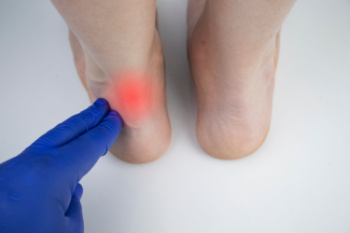
Ankle pain that worsens at night can be caused by several underlying conditions and may interfere with sleep and comfort. Peripheral neuropathy is one common cause, often resulting in burning, tingling, or sharp sensations due to damaged nerves. Morton’s neuroma, a thickening of nerve tissue typically found between the toes, can also cause radiating pain that extends to the ankle. A pinched nerve in the lower back or leg may lead to referred pain that becomes more noticeable when the body is at rest. Symptoms include aching, numbness, or shooting pain in and around the ankle. If you have ankle pain that may be more noticeable at night, it is suggested that you contact a podiatrist who can determine the cause and offer appropriate treatment solutions.
Ankle pain can be caused by a number of problems and may be potentially serious. If you have ankle pain, consult with Dawn Miles, DPM from Florida. Our doctor will assess your condition and provide you with quality foot and ankle treatment.
Ankle pain is any condition that causes pain in the ankle. Due to the fact that the ankle consists of tendons, muscles, bones, and ligaments, ankle pain can come from a number of different conditions.
Causes
The most common causes of ankle pain include:
- Types of arthritis (rheumatoid, osteoarthritis, and gout)
- Ankle sprains
- Broken ankles
- Achilles tendonitis
- Achilles tendon rupture
- Stress fractures
- Bursitis
- Tarsal tunnel syndrome
- Plantar fasciitis
Symptoms
Symptoms of ankle injury vary based upon the condition. Pain may include general pain and discomfort, swelling, aching, redness, bruising, burning or stabbing sensations, and/or loss of sensation.
Diagnosis
Due to the wide variety of potential causes of ankle pain, podiatrists will utilize a number of different methods to properly diagnose ankle pain. This can include asking for personal and family medical histories and of any recent injuries. Further diagnosis may include sensation tests, a physical examination, and potentially x-rays or other imaging tests.
Treatment
Just as the range of causes varies widely, so do treatments. Some more common treatments are rest, ice packs, keeping pressure off the foot, orthotics and braces, medication for inflammation and pain, and surgery.
If you have any questions, please feel free to contact one of our offices located in Palatka and Saint Augustine, FL . We offer the newest diagnostic and treatment technologies for all your foot care needs.

The Achilles tendon is the thick band of tissue that connects the calf muscles to the heel bone. It helps you walk, run, and jump by allowing your foot to push off the ground. Because it handles so much force, it can be injured through overuse, sudden movements, or lack of flexibility. When the tendon is strained or torn, healing can take time and depends on factors like blood flow, rest, and how the injury is treated. The tendon heals by forming new tissue, but this process is slower than in other areas of the body. Stretching, strengthening exercises, and targeted exercises often help the tendon recover. In more serious cases, surgery may be needed. If you notice pain or stiffness in the back of your ankle, it is suggested that you see a podiatrist for an accurate diagnosis and appropriate treatment.
Achilles tendon injuries need immediate attention to avoid future complications. If you have any concerns, contact Dawn Miles, DPM of Florida. Our doctor can provide the care you need to keep you pain-free and on your feet.
What Is the Achilles Tendon?
The Achilles tendon is a tendon that connects the lower leg muscles and calf to the heel of the foot. It is the strongest tendon in the human body and is essential for making movement possible. Because this tendon is such an integral part of the body, any injuries to it can create immense difficulties and should immediately be presented to a doctor.
What Are the Symptoms of an Achilles Tendon Injury?
There are various types of injuries that can affect the Achilles tendon. The two most common injuries are Achilles tendinitis and ruptures of the tendon.
Achilles Tendinitis Symptoms
- Inflammation
- Dull to severe pain
- Increased blood flow to the tendon
- Thickening of the tendon
Rupture Symptoms
- Extreme pain and swelling in the foot
- Total immobility
Treatment and Prevention
Achilles tendon injuries are diagnosed by a thorough physical evaluation, which can include an MRI. Treatment involves rest, physical therapy, and in some cases, surgery. However, various preventative measures can be taken to avoid these injuries, such as:
- Thorough stretching of the tendon before and after exercise
- Strengthening exercises like calf raises, squats, leg curls, leg extensions, leg raises, lunges, and leg presses
If you have any questions please feel free to contact one of our offices located in Palatka and Saint Augustine, FL . We offer the newest diagnostic tools and technology to treat your foot and ankle needs.

Foot pain can affect your daily life, especially when it involves the big toe or ball of the foot. Common causes include gout, bunions, and Morton’s neuroma. Gout is a type of arthritis caused by a buildup of uric acid, often resulting in sudden, intense pain, redness, and swelling, typically in the big toe. Bunions are bony bumps that form at the base of the big toe, leading to discomfort, stiffness, and difficulty walking. Morton’s neuroma involves thickening of tissue around a nerve in the ball of the foot, causing burning pain, tingling, or numbness between the toes. These conditions can make every step feel sharp, aching, or even electric. Wearing tight shoes or standing for long periods can worsen symptoms. A podiatrist can diagnose the cause of your foot pain through a physical exam and imaging. Treatment may include custom orthotics, medication, or minor procedures to relieve pain and restore comfort. If you have ongoing foot pain, it is suggested that you schedule an appointment with a podiatrist.
Foot Pain
Foot pain can be extremely painful and debilitating. If you have a foot pain, consult with Dawn Miles, DPM from Florida. Our doctor will assess your condition and provide you with quality foot and ankle treatment.
Causes
Foot pain is a very broad condition that could be caused by one or more ailments. The most common include:
- Bunions
- Hammertoes
- Plantar Fasciitis
- Bone Spurs
- Corns
- Tarsal Tunnel Syndrome
- Ingrown Toenails
- Arthritis (such as Gout, Rheumatoid, and Osteoarthritis)
- Flat Feet
- Injury (from stress fractures, broken toe, foot, ankle, Achilles tendon ruptures, and sprains)
- And more
Diagnosis
To figure out the cause of foot pain, podiatrists utilize several different methods. This can range from simple visual inspections and sensation tests to X-rays and MRI scans. Prior medical history, family medical history, and any recent physical traumatic events will all be taken into consideration for a proper diagnosis.
Treatment
Treatment depends upon the cause of the foot pain. Whether it is resting, staying off the foot, or having surgery; podiatrists have a number of treatment options available for foot pain.
If you have any questions, please feel free to contact one of our offices located in Palatka and Saint Augustine, FL . We offer the newest diagnostic and treatment technologies for all your foot care needs.










